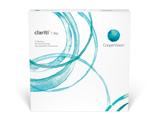
There are always seasonal challenges to overcome if you want healthy eyes. When it comes to winter, you have to deal with cold, dry, air when you are outdoors and dry heat while you are indoors. All of these winter elements can have a drying effect on your eyes; especially if you wear contact lenses. However, with these tips and the right contact lenses, you can make sure to get through the winter with healthy and vibrant eyes.
Start Off With the Right Contact Lenses for You
You can start off by using CooperVision’s Find Your Lens quiz. You can use it to find out which contact lens can help you achieve the best vision, comfort, and overall eye health. It is also an easy way for you to get the conversation started with your eye doctor about what contact lens is right for you.
Keep Contact Lenses Moist
Since indoor heat can be drying to your eyes and skin, using a humidifier can help ease the dryness that you may feel during the winter. Contact lenses need to stay moist in order to stay comfortable. CooperVision offers different contact lenses for different needs. Did you know that CooperVision’s Avaira contact lenses can keep the comfort going for as long as your day demands? If you have dry eyes, you may want to ask your eye doctor about Proclear. CooperVision’s Proclear contact lenses are the only contact lenses made with a material that is FDA approved for the claim: "may provide improved comfort for contact lens wearers who experience mild discomfort or symptoms relating to dryness during lens wear."
Protect Your Eyes
Using a hat and sunglasses can prevent winter winds from drying out your eyes. Wearing sunglasses year round, even in cloudy weather not only protects your eyes from the elements, but also protects them from harmful UV rays too. If you do wear a hat, make sure it is one that doesn’t shed too much to avoid getting bits of lint in your eyes since that can cause eye irritation.
We hope that these tips help you get through the winter with healthy eyes. If you have specific questions about contact lenses or contact lens care, make sure to talk to your eye doctor today.





